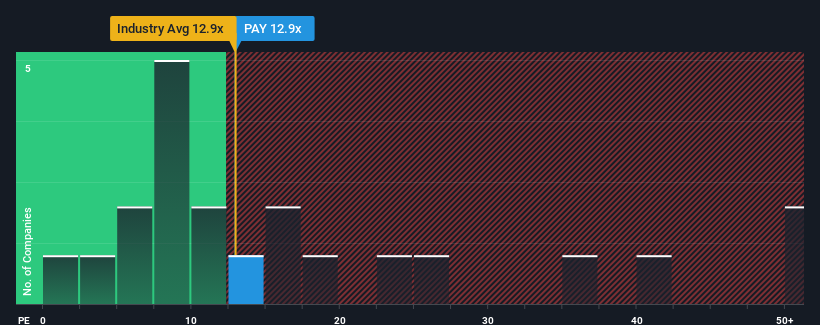- United Kingdom
- /
- Diversified Financial
- /
- LSE:PAY
PayPoint plc (LON:PAY) Might Not Be As Mispriced As It Looks
When close to half the companies in the United Kingdom have price-to-earnings ratios (or "P/E's") above 17x, you may consider PayPoint plc (LON:PAY) as an attractive investment with its 12.9x P/E ratio. However, the P/E might be low for a reason and it requires further investigation to determine if it's justified.
PayPoint hasn't been tracking well recently as its declining earnings compare poorly to other companies, which have seen some growth on average. It seems that many are expecting the dour earnings performance to persist, which has repressed the P/E. If this is the case, then existing shareholders will probably struggle to get excited about the future direction of the share price.
Check out our latest analysis for PayPoint

What Are Growth Metrics Telling Us About The Low P/E?
PayPoint's P/E ratio would be typical for a company that's only expected to deliver limited growth, and importantly, perform worse than the market.
Retrospectively, the last year delivered a frustrating 2.0% decrease to the company's bottom line. Even so, admirably EPS has lifted 113% in aggregate from three years ago, notwithstanding the last 12 months. Accordingly, while they would have preferred to keep the run going, shareholders would probably welcome the medium-term rates of earnings growth.
Turning to the outlook, the next year should generate growth of 46% as estimated by the three analysts watching the company. That's shaping up to be materially higher than the 17% growth forecast for the broader market.
With this information, we find it odd that PayPoint is trading at a P/E lower than the market. It looks like most investors are not convinced at all that the company can achieve future growth expectations.
What We Can Learn From PayPoint's P/E?
While the price-to-earnings ratio shouldn't be the defining factor in whether you buy a stock or not, it's quite a capable barometer of earnings expectations.
Our examination of PayPoint's analyst forecasts revealed that its superior earnings outlook isn't contributing to its P/E anywhere near as much as we would have predicted. There could be some major unobserved threats to earnings preventing the P/E ratio from matching the positive outlook. It appears many are indeed anticipating earnings instability, because these conditions should normally provide a boost to the share price.
Don't forget that there may be other risks. For instance, we've identified 3 warning signs for PayPoint (1 doesn't sit too well with us) you should be aware of.
It's important to make sure you look for a great company, not just the first idea you come across. So take a peek at this free list of interesting companies with strong recent earnings growth (and a low P/E).
New: Manage All Your Stock Portfolios in One Place
We've created the ultimate portfolio companion for stock investors, and it's free.
• Connect an unlimited number of Portfolios and see your total in one currency
• Be alerted to new Warning Signs or Risks via email or mobile
• Track the Fair Value of your stocks
Have feedback on this article? Concerned about the content? Get in touch with us directly. Alternatively, email editorial-team (at) simplywallst.com.
This article by Simply Wall St is general in nature. We provide commentary based on historical data and analyst forecasts only using an unbiased methodology and our articles are not intended to be financial advice. It does not constitute a recommendation to buy or sell any stock, and does not take account of your objectives, or your financial situation. We aim to bring you long-term focused analysis driven by fundamental data. Note that our analysis may not factor in the latest price-sensitive company announcements or qualitative material. Simply Wall St has no position in any stocks mentioned.
Have feedback on this article? Concerned about the content? Get in touch with us directly. Alternatively, email editorial-team@simplywallst.com
About LSE:PAY
PayPoint
Engages in the provision of payments and banking, shopping, and e-commerce services and products in the United Kingdom.
Reasonable growth potential with adequate balance sheet.
Market Insights
Community Narratives





